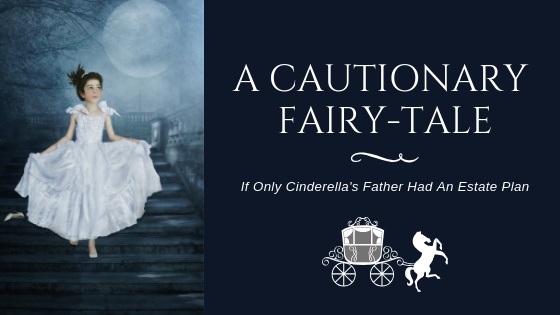A Cautionary Fairy-Tale – If Only Cinderella’s Father Had An Estate Plan
- January 23, 2019
- Admin
- Comments Off on A Cautionary Fairy-Tale – If Only Cinderella’s Father Had An Estate Plan

Written By: Lorena C. Van Assche & Amber D. Hughes Attorney’s with Ryley Carlock & Applewhite
Ah, the tale of Cinderella, a classic childhood favorite. We all know it as the story of an orphan who is mistreated by her Evil Stepmother and, with the help of her Fairy Godmother, wins over the heart of Prince Charming.
Often overlooked, however, is how the story began. Cinderella’s Mother died when Cinderella was a child. Cinderella’s Father remarried and shortly after, he also died. Cinderella’s Evil Stepmother then stole Cinderella’s inheritance and enslaved Cinderella in her own home. Surely, Cinderella’s parents never planned on this future for their lovely daughter. But, you see, it was the parents’ failure to plan for the future that put Cinderella in this terrible predicament. With a little planning—estate planning, that is—Cinderella never would have endured such suffering.
Avoid the Stepmother Trap
There are several ways a skilled estate planning attorney could have helped poor Cinderella, as we analyze author Charles Perrault’s beloved fairytale under modern-day Arizona law.
With no estate planning documents in place, Cinderella’s modern-day predicament would look like this: half of Cinderella’s Father’s estate would be distributed to Evil Stepmother, and half of the estate would be distributed to Cinderella, as a child of the father who was not also a child of Evil Stepmother. Being a minor, Cinderella’s half of the estate would be placed in one of two places.
The first place would be a Uniform Transfers to Minors Act (“UTMA”) account. An UTMA account requires a court-appointed custodian – presumably, Evil Stepmother – who should use those funds for Cinderella’s health, education, maintenance, and support. Unfortunately, with little oversight, we doubt Evil Stepmother would have complied with UTMA. Instead, Evil Stepmother likely would have used Cinderella’s share of the estate to benefit herself and her two biological daughters.
The second place the money might have been placed would be in a trust for the benefit of Cinderella. While the second option is the best option, someone (another family member, on Cinderella’s behalf) would have to petition the court to order that outcome, and it is unlikely that Evil Stepmother would do that for Cinderella.
Why Oh Why Didn’t Cinderella’s Father Create a Trust for His Precious Little Girl?
What Cinderella’s Father should have done was create a Revocable Living Trust Agreement (the “Trust”). He should have created the Trust after marrying Evil Stepmother to ensure there was no pesky “omitted spouse” claim. The Trust should state that (1) certain assets, as set forth on an attached Schedule A, are the separate property of Cinderella’s Father, (2) certain assets, if any, as set forth on an attached Schedule B, are the separate property of Evil Stepmother, and finally (3) that certain assets, as set forth on an attached Schedule C, are the community property of Cinderella’s Father and Evil Stepmother.
To assist with the trust administration after his death, Cinderella’s Father also should have named a neutral successor trustee, such as a friend, fiduciary, corporate trustee, or perhaps the best choice of all, Fairy Godmother. The Trust should state that, at the death of Cinderella’s Father, the Trust will be divided into two subtrusts, commonly referred to as an A/B split trust.
Trust A (the Survivor’s Trust) would be allocated all of Evil Stepmother’s separate property as well as one-half of the value of the community property assets. Trust B (the Decedent’s Trust) would be allocated all of Cinderella’s Father’s separate property as well as one-half of the value of the community property assets. The Trust could provide that Evil Stepmother would be able to use the Survivor’s Trust assets as she pleases and can only access the Decedent’s Trust assets (other than perhaps receiving income, if so stated in the estate documents) if the assets allocated to the Survivor’s Trust were depleted or illiquid. Having a neutral successor trustee to either work with Evil Stepmother or to oversee only the Decedent’s Trust would ensure that Cinderella’s share was not being improperly raided and depleted. Then, at the death of Evil Stepmother, the assets in the Decedent’s Trust would be distributed to Cinderella.
Creative Considerations for Dear “Cinderelly”
Other provisions can be added to such trusts that ensure Cinderella’s interests are protected. For example, a provision could be added that gives Cinderella the ability to request funds from the Decedent’s Trust, as needed, for health, education, maintenance or support (payable on her behalf, as a minor, and to her, once she is of age). Another provision could allow Cinderella to receive a portion of the Decedent’s Trust at a certain age or upon her marriage to Prince Charming, prior to Evil Stepmother’s death. Finally, another provision could allow the successor trustee to create and fund a 529 college savings account using funds from the Decedent’s Trust.
There are other possibilities, if Cinderella’s Father did not want to create a trust as described above because he was so utterly and completely in love with Evil Stepmother and wanted everything to be considered community property. In this case, he could have planned in some untraditional ways to still ensure Cinderella was cared for. For example, Cinderella’s Father could take out a million dollar term life insurance policy after his second marriage, naming Cinderella as the sole beneficiary and directing funds to be distributed to an UTMA account with a neutral custodian or to a support trust with a neutral trustee.
Cinderella Ultimately Inherited Litigation
In our modern-day analysis, the only inheritance Cinderella’s Father left her was likely litigation. Although not ideal, in circumstances like these, litigation affords the child of a parent with no estate plan, or with a poor estate plan, the opportunity to recover all or some of the property the child is rightfully entitled to receive. Assuming Cinderella’s Father died intestate (without a will), half of his estate should have passed to Evil Stepmother and the other half to Cinderella. Assuming Evil Stepmother either adopted Cinderella or was her court-appointed guardian, conservator or custodian, Evil Stepmother would owe Cinderella a fiduciary duty to protect her share of the inheritance and should have prepared an accounting of the assets that existed at the time of Cinderella’s Father’s death.
Of course, in the original story, Evil Stepmother never protected Cinderella’s interests and instead pillaged all of the assets. Cinderella, therefore, would have had a cause of action against Evil Stepmother for breach of fiduciary duty and conversion, among others. Fortunately, children like Cinderella are not without a remedy. An experienced estate litigation attorney can assess each case and determine what causes of action exist, the expected cost, and the likelihood of recovery.
Your Fairy Godmother Equivalent
Luckily, Cinderella had allies in the form of her Fairy Godmother and her many animal friends. If you have questions about estate planning, trust administration and estate litigation issues, there are many resources available to you. This includes the most powerful resource of all: calling upon an estate planning attorney to help you – and others – learn from the cautionary fairy-tale that is the Cinderella story.
Meet Your Storytellers:

Amber D. Hughes Ryley Carlock & Applewhite’s

Lorena C. Van Assche Ryley Carlock & Applewhite’s
You can find the original article Here
*Used with permission Copyright © 2019 Ryley Carlock & Applewhite. A Professional Association. All Rights Reserved.
Originally published in the Maricopa Lawyer, a publication of the Maricopa County Bar Association
*The information provided in this article is of a general nature and reflects only the opinion of the author at the time it was drafted. It is not intended as definitive legal advice, does not create an attorney-client relationship, and you should not act upon it without seeking independent legal counsel.
